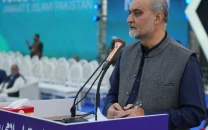The judiciary strikes back
Pakistan’s constitution has the capacity to yield change in high political office without resorting to a coup.

The judiciary strikes back
Unlike 1999, a lawfully elected prime minister has been removed from office without the intervention of the infamous 111 Brigade. However, eyebrows will be raised on how the Election Commission’s role under Article 63(3) of the Constitution could have been sidelined by the Supreme Court. Yet, it is reassuring that Pakistan’s constitutional architecture has the capacity to yield change in high political office without resorting to military coup d’etat.
The conviction for contempt and disqualification as member of Parliament had become inevitable for former Prime Minister Yousaf Raza Gilani. For more than two years, the ruling coalition resisted the order of the Supreme Court in the National Reconciliation Ordinance case. The Supreme Court’s decision in December 2009 had directed the government to “take immediate steps.” Instead of taking “immediate steps” as the Supreme Court ordered, Mr Gilani and his government dragged their feet for two years on writing to the Swiss authorities.
If failure to implement the verdict was not enough, Prime Minister Gilani and President Asif Ali Zardari decided to test the Supreme Court with brazen defiance and proclaimed that the present government will not write the letter to the Swiss authorities come what may.
Even then, the Supreme Court showed considerable leniency. Mr Gilani was given full opportunity to defend himself over the course of more than twenty hearings during the contempt case.
Repeatedly, Mr Gilani’s counsel, Aitzaz Ahsan, was told by the court that the contempt proceedings would be dropped if his client would relent and write the letter to the Swiss authorities even at that late stage. That was not to be.
In April, the Supreme Court order on contempt was criticised by many for not sending Mr Gilani to jail. However, the court was mindful that the conviction was “likely to entail some serious consequences in terms of Article 63(1)(g) of the Constitution” and was therefore treated as a mitigating factor towards the sentence of imprisonment. In other words, the effect of conviction itself was so ruinous, i.e. disqualification as member of Parliament, that the Supreme Court felt it was appropriate to show leniency in the matter of imprisonment.
The days of lenience finally ended. By late afternoon of June 19, the country discovered that the prime minister’s office had been lying vacant since 26 April, 2012. The perception that Mr Zardari’s government was backing real estate baron Malik Riaz and his allegations against the Chief Justice’s family did not help.
The plea for a larger bench was swiftly dispensed with. Aitzaz Ahsan’s magic made no impression in Court Room No.1. The Supreme Court’s notification of enhanced security measures was not without significance.
Critics will argue that even if the National Assembly speaker was wrong in her ruling under Article 63(2) of the Constitution, the next step in the disqualification procedure was a reference to the Election Commission of Pakistan to make the decisive ruling under Article 63(3). In other words, although disqualification was inevitable, it was required to be ordered through final determination by the Election Commission.
Undoubtedly, legal scholars will anxiously await the reasoning for the short order to understand how the Supreme Court determined that the Election Commission has no role to play in this controversy despite the language of Article 63(3). However, no legal wrangling can now alleviate the indignity of disqualification for the former Prime Minister Gilani.
Published In The Express Tribune, June 20th, 2012.



















COMMENTS
Comments are moderated and generally will be posted if they are on-topic and not abusive.
For more information, please see our Comments FAQ